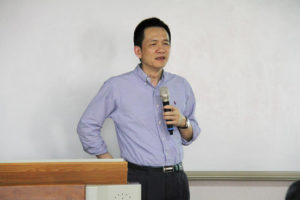Macro-Finance Salon (No. 58): Beauteous Trouble—How to Use China’s Huge Savings
2017-04-24 IMI First, Mr. Yao analyzed the source of China’s huge foreign exchange reserves, pointing out that a number of economic problems can be attributed to excessive reserves. China’s export-oriented growth model led to the substantial accumulation of foreign exchange reserves. And two conditions caused China’s export surge. First, China’s foreign trade has greatly increased since its accession to the WTO and the export grew by five times within just seven years. Second, China has undergone double demographic transition. On the one hand, China is now at the peak of demographic dividends. On the other, a large number of rural labor forces have migrated to cities. Thus, demographic transition has provided China with many labor forces. Though adequate labor force increased the export, it also slowed down the rise in domestic salaries and increased corporate revenues, thus adding to corporate savings. High savings of high earners raised the total household savings. Moreover, China’s fixed exchange rate is sticky as it reduced the relative prices of domestic products. So this further lowered salaries, raised the profits of the trading sector, and brought savings up. These factors jointly resulted in the huge savings.
First, Mr. Yao analyzed the source of China’s huge foreign exchange reserves, pointing out that a number of economic problems can be attributed to excessive reserves. China’s export-oriented growth model led to the substantial accumulation of foreign exchange reserves. And two conditions caused China’s export surge. First, China’s foreign trade has greatly increased since its accession to the WTO and the export grew by five times within just seven years. Second, China has undergone double demographic transition. On the one hand, China is now at the peak of demographic dividends. On the other, a large number of rural labor forces have migrated to cities. Thus, demographic transition has provided China with many labor forces. Though adequate labor force increased the export, it also slowed down the rise in domestic salaries and increased corporate revenues, thus adding to corporate savings. High savings of high earners raised the total household savings. Moreover, China’s fixed exchange rate is sticky as it reduced the relative prices of domestic products. So this further lowered salaries, raised the profits of the trading sector, and brought savings up. These factors jointly resulted in the huge savings.
 Then Mr. Yao mentioned some problems that rise from such huge savings. The first problem is that speculative investments have produced many asset bubbles in China’s stock and real estate market. The second is that inflating asset prices can centralize wealth and thus exacerbate inequality in wealth and income distribution.
At last, Mr. Yao elaborated on how to use wisely China’s huge savings. The major method is to buy time for further adjustments and postpone the monetary problem. First, growth should be boosted to dilute the currency. Second, more efficient investments should be made to raise asset returns. Third, the cost may be transferred to later generations through the issuance of government bonds and pre-consumption for the public. The capital that the government obtains through issuance of bonds can be invested in improving infrastructure and people’s livelihood.
During Q&A, Mr. Yao also discussed with the participants the definition of capital outflow, the ways of currency loss, and whether we responsible for later generations if we make pre-consumption.
Prof. Zhao Xijun commented on Yao’s speech. He maintained that China now has a large economic aggregate and quite moderate economic growth, but the core problem lies in the structure. Yao Yang also mentioned some ways to change the consumption structure, but whether there are other ways to improve China’s investment and consumption structure is still a question worth of consideration.
Then Mr. Yao mentioned some problems that rise from such huge savings. The first problem is that speculative investments have produced many asset bubbles in China’s stock and real estate market. The second is that inflating asset prices can centralize wealth and thus exacerbate inequality in wealth and income distribution.
At last, Mr. Yao elaborated on how to use wisely China’s huge savings. The major method is to buy time for further adjustments and postpone the monetary problem. First, growth should be boosted to dilute the currency. Second, more efficient investments should be made to raise asset returns. Third, the cost may be transferred to later generations through the issuance of government bonds and pre-consumption for the public. The capital that the government obtains through issuance of bonds can be invested in improving infrastructure and people’s livelihood.
During Q&A, Mr. Yao also discussed with the participants the definition of capital outflow, the ways of currency loss, and whether we responsible for later generations if we make pre-consumption.
Prof. Zhao Xijun commented on Yao’s speech. He maintained that China now has a large economic aggregate and quite moderate economic growth, but the core problem lies in the structure. Yao Yang also mentioned some ways to change the consumption structure, but whether there are other ways to improve China’s investment and consumption structure is still a question worth of consideration.

